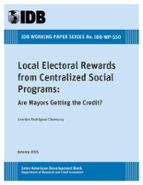Local Electoral Rewards from Centralized Social Programs: Are Mayors Getting the Credit?
Date
Jan 2015
This paper uses variation in the timing of the Mexican antipoverty program's introduction across municipalities to identify its impact on the share of votes for the local incumbent party. Evidence is found that voters reward the mayor's party for the central benefit to their constituencies, accounting on average for 2.8 additional percentage points in the share of votes for the mayor's party. The analysis of party alignment shows that this electoral effect cannot be explained as a reward for the federal incumbent in local elections. Alternative explanations are examined, and it is shown that the effect for the local incumbent is heterogeneous for the different political parties and varies with characteristics of the municipalities, being stronger where the mayor faced more contestable elections, in capital cities of the states and in predominantly urban, more educated and relatively wealthier municipalities. Findings are consistent with the hypothesis that politicians have incentives to engage in signaling strategies to link themselves to the transfer program.



